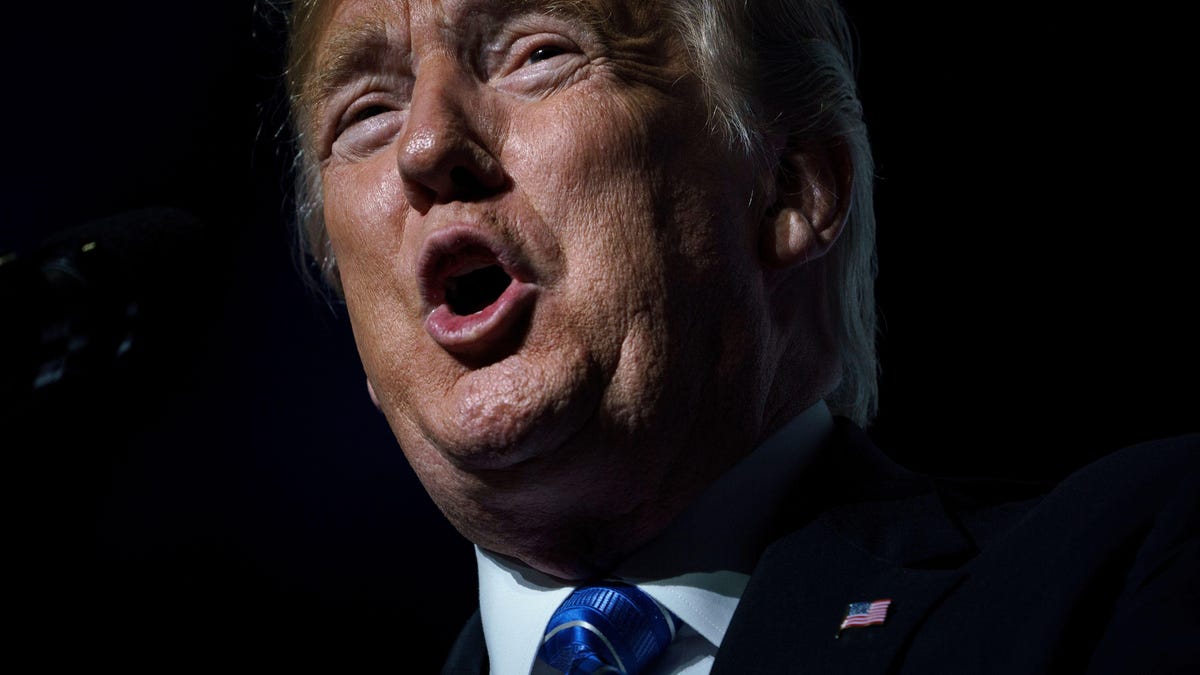Trump blasts his own FCC for blocking Sinclair-Tribune merger
The president gives the FCC a tongue-lashing on Twitter for questioning whether Sinclair had misled regulators.
President Donald Trump bashed the Federal Communications Commission on Twitter for potentially killing the $3.9 billion megadeal between Sinclair Broadcast Group and Tribune Media.
Last week, FCC Chairman Ajit Pai, a Trump appointee, said he had "serious concerns" about the deal. The five-member commission then voted to refer the merger to an administrative hearing, the first step in a process to challenge the deal. Regulators expressed concern that they had been misled by Sinclair about some of the station divestitures the company had proposed.
Trump took to Twitter Tuesday evening saying it was "so sad and unfair" that the FCC did not approve the merger, which would have given Sinclair, well-known for its conservative views, access to more than 70 percent of TV viewing households in the US.
In his tweet, he lamented that the deal would have provided a "conservative voice for and of the People." He compared the deal to the Comcast/NBC merger approved in 2011, which was a much different deal, combining a cable company with a broadcaster.
"Liberal Fake News NBC and Comcast gets approved, much bigger, but not Sinclair. Disgraceful!" he tweeted.
This isn't the first time that Trump has inserted his views into deliberations of a major media merger. As a candidate for president, Trump vowed to block the merger between AT&T and Time Warner, saying it would concentrate too much power in one company. The president has also threatened to have the FCC cancel the broadcast licenses of NBC for unfavorable coverage that he also called "fake news."
All of this calls into question how Trump views his authority over independent agencies, such as the FCC and the Department of Justice, which reviews large mergers. Democrats on Capitol Hill have raised questions about the Justice Department's motivations and the White House's influence in deciding to take AT&T to court to stop the merger with Time Warner. In June, a district judge sided with AT&T and Time Warner. But the government is appealing the decision.
Trump's tweet also touches on a contentious debate happening in the country over how conservative viewpoints are covered by the mainstream media and on social media, which many conservatives say is biased. Meanwhile, Sinclair, which has routinely pushed its local stations to air so-called "must-run" segments that many journalists at these news outlets have said they're uncomfortable airing, is seen as a counter to these other outlets. As the largest local broadcaster in the country, the company already controls more than 200 TV stations. The deal with Tribune would further consolidate the company's influence and reduce the number of independent voices in many communities.
Critics of the merger, ranging from consumer rights groups to Democrats, say it would give Sinclair, regardless of its political leanings, too much power to influence local media. But Sinclair argues that the deal is critical to ensuring the future of free, over-the-air television, and that it better positions the company to compete with online giants such as Facebook and Google for advertising.
The FCC's concerns
Sinclair Broadcast is already the largest TV broadcasting company, owning 193 television stations and 589 channels in 89 markets. Tribune Media owns 42 television stations. Many of those stations serve major cities such as New York, Los Angeles, Chicago and Washington, DC. By combining, the companies would exceed the FCC's cap on market share. In April, Sinclair offered to sell 23 TV stations to get under that cap. But some of the companies that Sinclair said would buy those stations, still had ties to Sinclair.
"The evidence we've received suggests that certain station divestitures that have been proposed to the FCC would allow Sinclair to control those stations in practice, even if not in name, in violation of the law," Pai said in his statement.
Pai's statement was unexpected given that many critics believed he was trying to relax policies to pave the way for the Sinclair-Tribune merger. In February, the inspector general of the FCC reportedly began investigating Pai to determine if he had inappropriately pushed for rule changes that would help make the Sinclair merger easier to approve. Pai has denied these claims.
During a House oversight committee hearing on Wednesday, Pai said Trump's criticism would not effect its decision on the Sinclair-Tribune merger.
"I stand by our decision," Pai told members of the House Commerce Committee's technology and communications subcommittee.
On Tuesday evening, Democratic Commissioner Jessica Rosenworcel responded to Trump's tweet with her own: "Disagree."
Sinclair also did not respond to a request for comment. But the company said in a statement issued last week after the FCC's vote that it was "shocked and disappointed" that the FCC has issues with the deal. The company has amended its merger in the hopes of winning approval. And it's vowed to continue to fight for the merger.
"We are prepared to resolve any perceived issues and look forward to finalizing our acquisition of Tribune Media," the company said in a statement last week.
This story was first published on Wednesday July 25, 2018 at 9:30 am PT.
Update 11:50 am PT: This story was updated with a comment from Chairman Ajit Pai during a Congressional subcommittee hearing on Wednesday afternoon.
iHate: CNET looks at how intolerance is taking over the internet.
Tech Enabled: CNET chronicles tech's role in providing new kinds of accessibility.


